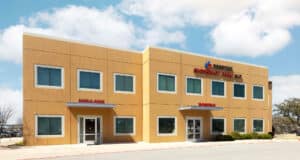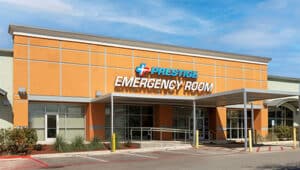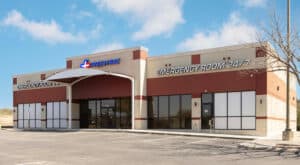Pediatric ER Treatment for Child Diarrhea in San Antonio
You may have a 1-year-old child with persistent diarrhea or a toddler whose diarrhea is now accompanied by a fever. As a parent, knowing what to do and what to watch for when your child has diarrhea is essential. For children, diarrhea can take a toll more quickly than in adults. Depending on their symptoms, you may need to take your child to an emergency room. Our caring, experienced providers at Prestige ER can rapidly diagnose and treat pediatric diarrhea.
When to Take a Child to the ER for Diarrhea
A primary concern when it comes to diarrhea in children is dehydration. Diarrhea causes the loss of significant amounts of water. Because of their smaller body mass, children have smaller reserves of fluids than adults and can quickly become dehydrated. Dehydration can become serious and may require pediatric diarrhea treatment, including IV fluids. Electrolyte imbalances may also result from persistent diarrhea and should be corrected in an emergency room.
If your child has diarrhea that doesn’t improve within a few days, or they have dark or sticky stools (signs of blood in the stool), develop abdominal pain, or show signs of dehydration, you should bring them to the ER for evaluation and treatment. Diarrhea with a fever in a toddler, infant, or older child can be an indicator of dehydration or another condition. It is important to monitor your child for signs of dehydration.
Symptoms of Dehydration
- Dry mouth and tongue.
- Extreme thirst.
- Dry skin.
- Sunken appearance to the eyes or cheeks.
- Crying without tears.
- Weakness or lethargy.
- Fatigue.
- Decreased urination (dry diapers for over three hours in infants).
- Dark yellow urine.
- A fever higher than 102°F.
Other Symptoms Associated with Pediatric Diarrhea
Your child may have other symptoms along with diarrhea, including:
- Nausea.
- Vomiting.
- Bloating.
- Abdominal cramps.
- Urgent need to have a bowel movement.
Pediatric Diarrhea Treatment in the ER
In the emergency room, a caring provider will examine your child, collect vital signs, and discuss your child’s symptoms with you. Expect to be asked about your child’s pertinent medical history and family medical history. This information enables your provider to determine the cause of your child’s diarrhea and the risk factors for certain bowel disorders. Your child’s provider may order lab tests or diagnostic imaging, such as a CT scan or ultrasound.
Once a diagnosis becomes clear, appropriate treatment will be ordered to relieve your child’s symptoms and treat the underlying cause. Treatment may include medication to treat an infection, anti-nausea medication, and IV therapy. Your child may need IV fluids to quickly rehydrate them and provide electrolytes.
We work to ensure your child receives a rapid diagnosis and evidence-based treatment. Our caring providers will take the time to put you and your child at ease and answer your questions. In some cases, more extensive treatment may be required, such as surgery. If so, we can transfer your child to a hospital with our private ambulance service.
Causes of Diarrhea
- Bacteria or Parasites. Pathogens (bacteria or parasites) in contaminated food or water can cause pediatric diarrhea.
- Viruses. Rotavirus is a common cause of childhood diarrhea. Other viruses that cause diarrhea include norovirus and viral hepatitis. SARS-CoV-2, the virus that causes COVID-19, has also caused diarrhea in some cases.
- Lactose Intolerance. Lactose is found in milk, cheese, ice cream, and other dairy products and may trigger diarrhea in children who cannot digest it normally.
- Celiac Disease. Children with celiac disease may experience diarrhea after eating gluten, a protein found in wheat products and some other grains.
Helping Your Child Recover from Diarrhea
There are several things you can do to help your child as they recover from diarrhea:
- Encourage Fluids. Your child must drink plenty of fluids. This is especially true if a fever accompanies their diarrhea, as they can lose body water even more quickly. Though effective for hydration normally, plain water is not the best choice for diarrhea. Pedialyte is a good choice, as it contains important electrolytes. Broth is another good option for the same reason. Your child can have sports drinks or juice, but be mindful that too much sugar can worsen diarrhea. For very young children who take formula or breastmilk, continue these fluids.
- Use the B.R.A.T. Diet. As your child’s diarrhea resolves, gradually introduce easily digestible foods, including bananas, rice, applesauce, and toast (B.R.A.T.). Avoid spicy, greasy, or rich foods.
- Wash Hands. Ensure you, your child, and every other family member wash their hands thoroughly and often. This can help prevent the spread of diarrhea caused by a virus.
- Ask About Anti-diarrheal Medicine. Certain over-the-counter medications, including loperamide (Imodium) and bismuth subsalicylate (Pepto Bismol), can relieve diarrhea. In some cases, it is best not to give medicine to stop diarrhea. This is often true for diarrhea caused by a virus or bacteria. Additionally, some of these medications are not recommended for use in children. Talk to your provider before giving any of these to your child.
Prestige ER is veteran-owned and here to serve San Antonio with prompt, expert pediatric emergency care. Visit any of our three locations for superior medical care for pediatric diarrhea and many other emergency conditions.












